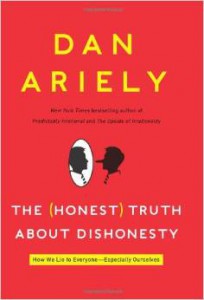 When Dan Ariely writes about the importance of “establishing rules that can safeguard ourselves from ourselves,” I immediately think about how resonant that thought is with the Vested mindset.
When Dan Ariely writes about the importance of “establishing rules that can safeguard ourselves from ourselves,” I immediately think about how resonant that thought is with the Vested mindset.
After all, Vested’s Five Rules are designed to transform business relationships and provide effective safeguards to counter the various ailments that can plague those relationships, such as the activity trap, driving blind disease and the junkyard dog factor.
Ariely, Duke University professor of psychology and behavioral economics, is a wonderful author and shares great insights from his research. His most recent book, The (Honest) Truth About Dishonesty: How We Lie to Everyone – Especially Ourselves examines how people deal with honesty and dishonesty in their interactions, both business and personal. He goes on to explain how people can trick themselves into thinking they control their decisions.
Creativity can be a double-edged sword. In a section called The Cheater’s Department, Ariely quotes Pablo Picasso, who said, “Good artists copy, great artists steal.” In many circles, including journalism and business, this is also known as creative borrowing. It’s also a facet of innovation, where a creative, innovative idea or product comes to life and then is copied, changed, improved and subject to further innovation. Is that stealing? Innovation? Both?
“Even Steve Jobs occasionally boasted that much like Picasso, Apple was shameless about stealing great ideas,” says Ariely. So it follows that creativity is a “guiding force” when it comes to cheating, and when you think about it that makes sense—because it takes a huge amount of creativity to cheat successfully, especially when the cheating activity goes undiscovered. I’m reminded of Keyser Söze (in the Usual Suspects), the ultimate con artist—and much more—as I write this. So there can be, and often is, a dark side to creativity – but geniuses such as Picasso and Shakespeare probably would not think too deeply about that: they were more concerned about the results, the art, the product.
My take is that the Vested mindset, which hinges on trust, honesty and integrity in business relationships, is also flexible and nuanced enough to cope with the grey areas that creative and innovative impulses might bring to the table. The trick is to not delude yourself or the organization, to maintain a moral compass, and to prevent the “dishonesty germ,” as Ariely puts it, from becoming an infection. And to have rules in place that safeguard ourselves from ourselves.